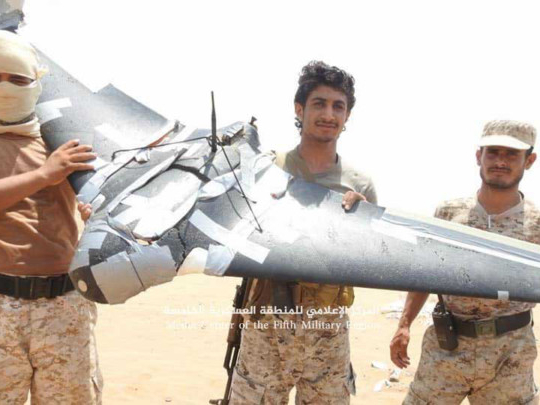
Dubai: Saudi Arabia’s military brought down an Al Houthi drone at an international airport in the southern city of Abha, Saudi-owned broadcaster Al Arabiya reported on Wednesday, citing field sources.
The sources said air traffic was not interrupted.
Yemen’s armed Iran-backed Al Houthi movement said earlier it had launched a drone strike on a facility belonging to state oil firm Saudi Aramco, though the company said its facilities there were operating “normally and safely”.
In other developments, the UAE Armed Forces’ anti-aircraft defence unit said it had intercepted an Iranian Qassef-1 aircraft loaded with explosives intended to be smuggled into Al Houthi hands. Al Houthis were planning to use the weapons to strike strategic positions of Yemeni forces backed by the Arab Coalition on Yemen’s Red Sea Coast.
The Arab Coalition, led by Saudi Arabia, says it is consistently working to counter Iran’s weapon smuggling, which poses a direct threat not only to the Yemeni forces and people, but also threatens international maritime traffic along the Red Sea.
The Saudi-led Arab coalition entered the Yemeni war in 2015 just months after an Al Houthi coup forced internationally-recognised Yemeni president Abd Rabbo Mansour Hadi out of power.
He later was able to escape house arrest and flee to Aden where he temporarily shifted government headquarters.
Since then, the coalition has gained back 86 per cent of Yemeni territory but major population centres still remain under Al Houthi control.
Saudi Arabia and the US have accused Iran of illegally smuggling weapons into Yemen to sustain Al Houthi war efforts.
In December, one such Iranian-made ballistic missile was fired towards Riyadh for the first time in the three-year war.
Although it was intercepted, Riyadh called it an ‘act of war’.
The war has cost the lives of thousands of Yemenis and pushed the Arab world’s poorest country to the brink of famine.
The latest government push seeks to take advantage of cracks in the awkward Al Houthi alliance with former Yemeni President Ali Abdullah Saleh’s supporters.
Saleh ruled Yemen for more than three decades until he was forced to resign following an Arab Spring uprising in 2011.
He remained in the country, however, and continued to wield power from behind the scenes.
In 2014, his forces allied with Al Houthi militia, despite the fact that as president he had gone to war with them.
There had been simmering tensions between the two awkward allies in past months that boiled over in December when Saleh suggested he would cooperate with Hadi — he was assassinated shortly after.
Since then senior members of Saleh’s party have either been executed or placed under house arrest by Al Houthis amid a draconion crackdown.
The broken alliance between Al Houthis and forces loyal to Saleh appears to be permanent, which will help the Yemeni government and its backers in the Saudi-led coalition weaken their grip on the country given the reduction in manpower.
In a recent meeting with New York Times editors, Saudi Crown Prince Mohammad Bin Salman said that Al Houthis have become increasingly isolated politically.
He dismissed the seven missiles Al Houthis fired at Saudi Arabia from Yemen on March 25 as “a last-ditch effort” that only showed they were weak.
Saudi Arabia, he said, is now seeking to end the war through a political process, trying to divide Al Houthis and maintaining military pressure on them.












